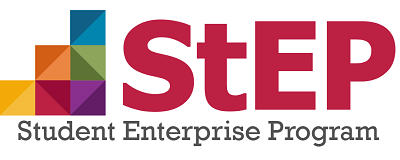HISTORY OF StEP
Many students with an entrepreneurial drive find methods to capitalize on ideas that can result in the exchange of goods and services for a fee. Within Washington University in St. Louis (WashU), the late James E. McLeod – the former Vice Chancellor for Students and Dean of the College of Arts & Sciences, was a proponent of education both inside and outside the classroom. His commitment to intellectual life resulted in the notion and instillation of storefronts in Gregg Hall, on the south 40 in 1999 – which still serve as the location for student-run businesses that operate on campus today! These businesses are established as part of the Student Enterprise Program (StEP) which supports undergraduates at WashU to develop, start and manage their own businesses/non-profits on campus.
Initially housed in Student Involvement & Leadership, StEP affords a high-impact educational experience and real-world business know-how that distinguishes WashU from other institutions. Following the uptick in new business creations in January 2015, initiated by the launch of Bear-y Sweet Shoppe and The Shopping Stop, StEP moved to become part of the Skandalaris Center for Interdisciplinary Innovation & Entrepreneurship in 2016, further reinforcing the focus on the entrepreneurial experiences gained as part of the program. This includes students having access to numerous workshops (e.g., “Building a business”, “Selling a business”) alongside learning how to file and acquire the necessary documentation, licenses, legalities, and taxes for their business. Through StEP, there is continued access to regular support tailored to provide guidance for student business operations as well as the annual renewal process where businesses present their current operations and financials, alongside projections and plans for the following year. StEP also serves in an advisory capacity once businesses become established on campus, to ensure expected business practices are upheld.
Together with educational experiences, StEP is committed to reducing and removing barriers for students of all backgrounds interested in entrepreneurial activities. In that endeavor, a forgivable StEP Loan Fund was developed to help students who are interested in this learning experience to participate regardless of their financial situation. The Loan Fund would not have been possible without the generous donations from previous StEP business owners and their families, who appreciated the benefit of the StEP experience and wanted to support the potential for others to partake in the program. Many StEP business owners have highlighted how the Loan Fund helped them not only participate in StEP but to become fiscally responsible and learn about interest rates and the associated risks and responsibilities when taking out a loan.
Gallery 314’s previous business owner Drake Shafer, remarked upon how the StEP program served as an inclusive platform for students like himself who come from a low socioeconomic background and do not have the resources, contacts, and support to operate and manage a business. Mr. Shafer mentioned that “StEP provides an avenue to explore entrepreneurship in a reduced risk zone, with support from dedicated staff who ensure you learn from all outcomes.” Similar sentiments were echoed by Refresh previous owner Prince Azoro who also highlighted that “despite the financial support and operating a business on campus, you are still under the same judication as any other business such as economic (e.g., weather conditions impacting supply lines) and financial (e.g., rent payment) aspects.” For other students who may not feel comfortable taking out a loan or financially investing in a business but wish to gain experience amongst the portfolio of businesses, StEP boasts: Sharing with A Purpose (SWAP) is a non-profit in which students are not required to financially buy-into become involved.
As the primary goal of StEP is to ensure students learn about the process of starting, owning, and managing a business – not all businesses have remained in the program for the past 20 years. During the COVID-19 pandemic, we saw businesses in StEP not only be created and shut down but also graduate from the program and be brought out to operate independently of the university.
One example of a business impacted by the pandemic was OffTheRow, which provided custom apparel. Due to social distancing guidelines, student groups were no longer hosting events, and students themselves did not frequent the campus. This also resulted in the hesitancy of potential owners buying into the business, and due to operating costs and legal fees, the current owners decided it would be best to close. Irrespective of the outcome, a previous owner, Shay Bidani, explained how “the framework of StEP allowed for the unique opportunity to have 100% autonomy for a company which was both exciting and exhilarating. When making the decision to close, I was able to gain real-world experience in a supported environment.” Contrastingly, a storage vendor – UTrucking, which has operated in StEP since its’ genesis – survived competition over the past two decades and even merged with another StEP business – was able to graduate from StEP in 2021 to operate outside the WashU ecosystem.
The concept of students aged between 18 and 22 owning/starting a business on a university campus is unfathomable to some. However, this experience has proven invaluable for many of our StEP business owners, who have gone on to become successful entrepreneurs after graduating and even Forbes 30 under 30 awardees.


